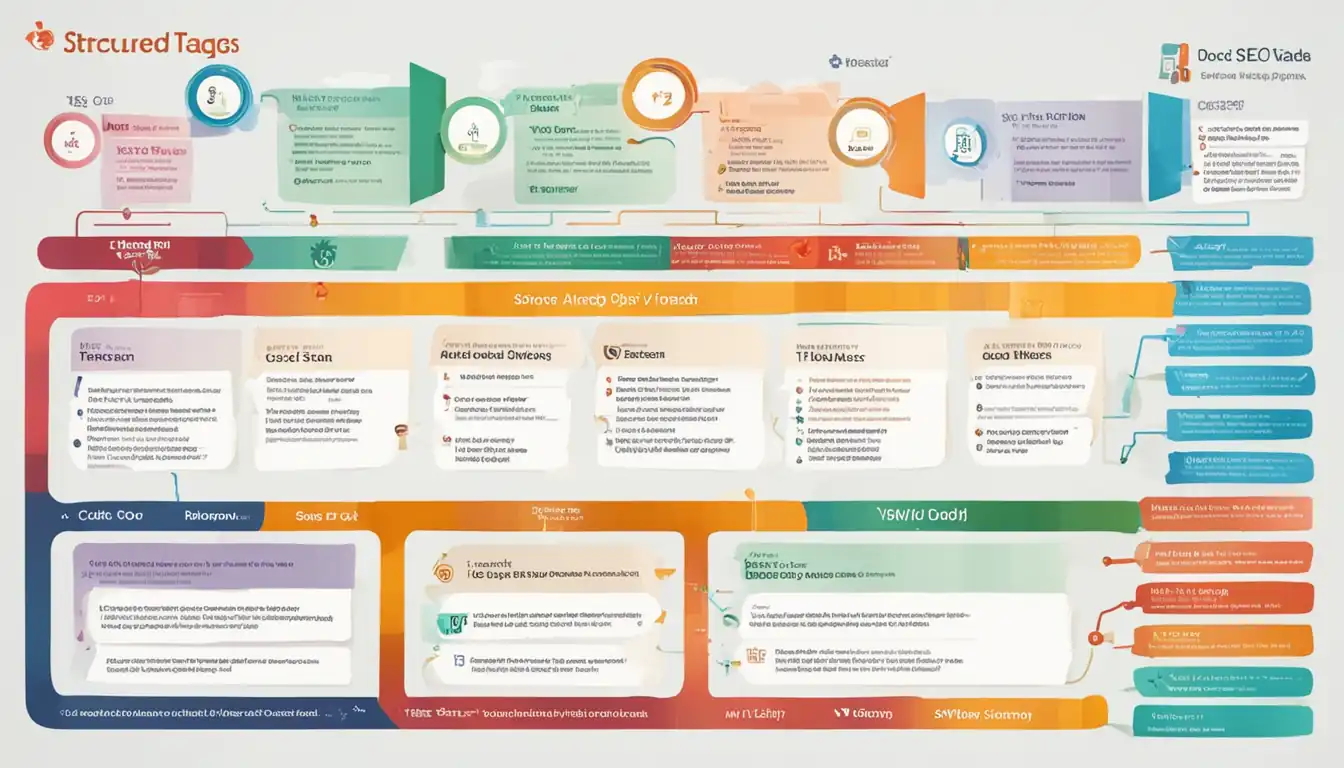Mastering Meta Tags Optimization for Enhanced SEO Performance

When it comes to conquering the world of SEO, mastering meta tags optimization is like having a secret weapon in your arsenal. These tiny snippets of code hold immense power in boosting your website's visibility and driving organic traffic. In this post, we'll delve into the nitty-gritty of meta tags, from understanding the basics to exploring advanced strategies that can take your SEO performance to new heights.
Understanding the Basics of Meta Tags
What Are Meta Tags and Why Are They Important
Meta tags are snippets of text that describe a page's content. They do not appear on the page itself but in the HTML code of the page, providing information about the webpage to search engines. Meta tags play a crucial role in SEO as they help search engines understand what a webpage is about and how it should be indexed.
Key Types of Meta Tags in SEO
Title Tag: This is one of the most important meta tags as it tells search engines and users what the page is about. It appears as the clickable headline in search engine results.
Meta Description Tag: This tag provides a brief summary of the content on the webpage. While it doesn't directly impact rankings, it can influence click-through rates.
Meta Keywords Tag: Once an essential meta tag for SEO, its importance has diminished over time due to keyword stuffing abuse. Search engines now focus more on content relevance rather than specific keywords.
Meta Robots Tag: This tag instructs search engine crawlers on how to index and display a webpage. It can control whether a page should be indexed, followed, or archived.
Canonical Tag: This tag helps prevent duplicate content issues by specifying the preferred version of a webpage when multiple versions exist.
Viewport Tag: With mobile optimization becoming increasingly important, this tag specifies how a webpage should be displayed on different devices.
Open Graph Tags: These tags are used to control how content appears when shared on social media platforms like Facebook and Twitter.
Schema Markup: While not technically meta tags, schema markup provides additional context to search engines about specific types of content (e.g., events, recipes) on a webpage.
Incorporating these key types of meta tags effectively can significantly enhance your website's SEO performance and visibility in search engine results pages (SERPs).
Crafting Compelling Meta Titles

Meta titles are a crucial element of on-page SEO optimization. They serve as the first impression for search engines and users, providing a concise summary of the content on a webpage. Crafting compelling meta titles can significantly impact click-through rates and overall SEO performance.
Best Practices for Title Tag Optimization
- Include Target Keywords: Incorporate relevant keywords that accurately reflect the content of the page.
- Keep it Concise: Aim for a title tag length of 50-60 characters to ensure it displays properly in search results.
- Be Descriptive: Clearly convey what the page is about to entice users to click.
- Unique Titles: Avoid duplicate meta titles across different pages to prevent confusion for search engines.
- Brand Consistency: Include your brand name at the end of the title tag for brand recognition.
Common Mistakes to Avoid with Title Tags
- Keyword Stuffing: Overloading title tags with keywords can harm SEO efforts and appear spammy.
- Irrelevant Titles: Ensure that the meta title accurately represents the content on the page to avoid misleading users.
- Generic Titles: Stand out from competitors by crafting unique and descriptive meta titles that capture attention.
- Ignoring Character Limits: Exceeding character limits can result in truncated titles in search results, impacting visibility.
Remember, optimizing meta titles is an essential component of effective SEO strategies. By following best practices and avoiding common mistakes, you can enhance your website's visibility and drive more organic traffic.
Optimizing Meta Descriptions for Maximum Impact
Meta descriptions play a crucial role in enticing users to click on your website in search engine results. Crafting compelling and relevant meta descriptions can significantly improve your click-through rates and ultimately enhance your SEO performance.
Crafting Descriptions That Captivate
When creating meta descriptions, it is essential to keep them concise, informative, and engaging. Here are some tips to craft descriptions that captivate:
- Be Concise: Keep your meta description under 160 characters to ensure it is fully displayed in search results.
- Include Keywords: Incorporate relevant keywords that accurately reflect the content of the page.
- Provide Value: Clearly communicate the benefits or information users can expect to find on the page.
- Create a Call-to-Action: Encourage users to take action by including a compelling call-to-action.
Techniques to Boost Click-Through Rates with Meta Descriptions
Enhancing your meta descriptions can lead to higher click-through rates and improved SEO performance. Here are some techniques to boost click-through rates with meta descriptions:
- A/B Testing: Experiment with different variations of your meta descriptions to determine which ones resonate best with your audience.
- Use Numbers or Symbols: Incorporating numbers or symbols can make your meta description stand out and attract more clicks.
- Highlight Unique Selling Points: Showcase what sets your content apart from competitors to entice users to click through.
- Match Search Intent: Ensure your meta description aligns with the user's search intent to increase relevance and attract qualified traffic.
By implementing these strategies, you can optimize your meta descriptions for maximum impact and drive more traffic to your website.
Harnessing the Power of Header Tags and Structured Data

Integrating Header Tags with Meta Information
When it comes to optimizing your website for search engines, integrating header tags with meta information is crucial. Header tags (H1, H2, H3, etc.) help search engines understand the structure and hierarchy of your content. By including relevant keywords in your header tags and aligning them with your meta title and description, you can improve your website's visibility in search results.
Key Points:
- Use H1 tag for the main title of your page
- Utilize H2-H6 tags for subheadings
- Ensure consistency between header tags and meta information
Leveraging Structured Data for SEO
Structured data markup provides search engines with additional context about your content, helping them better understand the purpose and relevance of your web pages. By incorporating structured data markup such as Schema.org into your website, you can enhance the visibility of your content in search results and drive more targeted traffic to your site.
Key Points:
- Implement Schema.org markup for rich snippets
- Use structured data to highlight key information
- Monitor performance through Google Search Console's Structured Data report
Advanced Strategies in Meta Tags Optimization
Meta tags are an essential component of on-page SEO optimization. By mastering the art of meta tags optimization, you can significantly enhance your website's visibility and improve its search engine ranking. In this section, we will delve into advanced strategies that can take your meta tags optimization to the next level.
Using Schema Markup to Enhance Visibility
One advanced strategy in meta tags optimization is leveraging schema markup to enhance visibility in search engine results pages (SERPs). Schema markup is a form of microdata that provides search engines with additional context about the content on your website. By implementing schema markup, you can make your website more attractive and informative in SERPs, which can lead to higher click-through rates and improved SEO performance.
Key Points:
- Schema markup provides search engines with additional context about your content.
- Implementing schema markup can make your website more attractive and informative in SERPs.
- Schema markup can lead to higher click-through rates and improved SEO performance.
Exploring the Role of Social Media Meta Tags in SEO
Social media meta tags play a crucial role in optimizing your website for social sharing and engagement. These meta tags provide social media platforms with specific information about your content when it is shared, ensuring that it appears correctly and attractively on social media feeds. By optimizing your social media meta tags, you can increase the visibility of your content on social platforms, drive more traffic to your website, and improve overall SEO performance.
Key Points:
- Social media meta tags provide specific information about your content when shared on social platforms.
- Optimizing social media meta tags can increase the visibility of your content on social platforms.
- Well-optimized social media meta tags can drive more traffic to your website and improve overall SEO performance.
Conclusion
By honing your skills in crafting compelling meta titles, optimizing descriptions for maximum impact, and harnessing the power of header tags and structured data, you'll be well on your way to dominating the search engine results pages. Remember, meta tags are not just about ticking boxes - they're about engaging with your audience and standing out in a crowded online landscape. So go ahead, dive into the world of meta tags optimization and watch as your SEO performance soars to new heights!